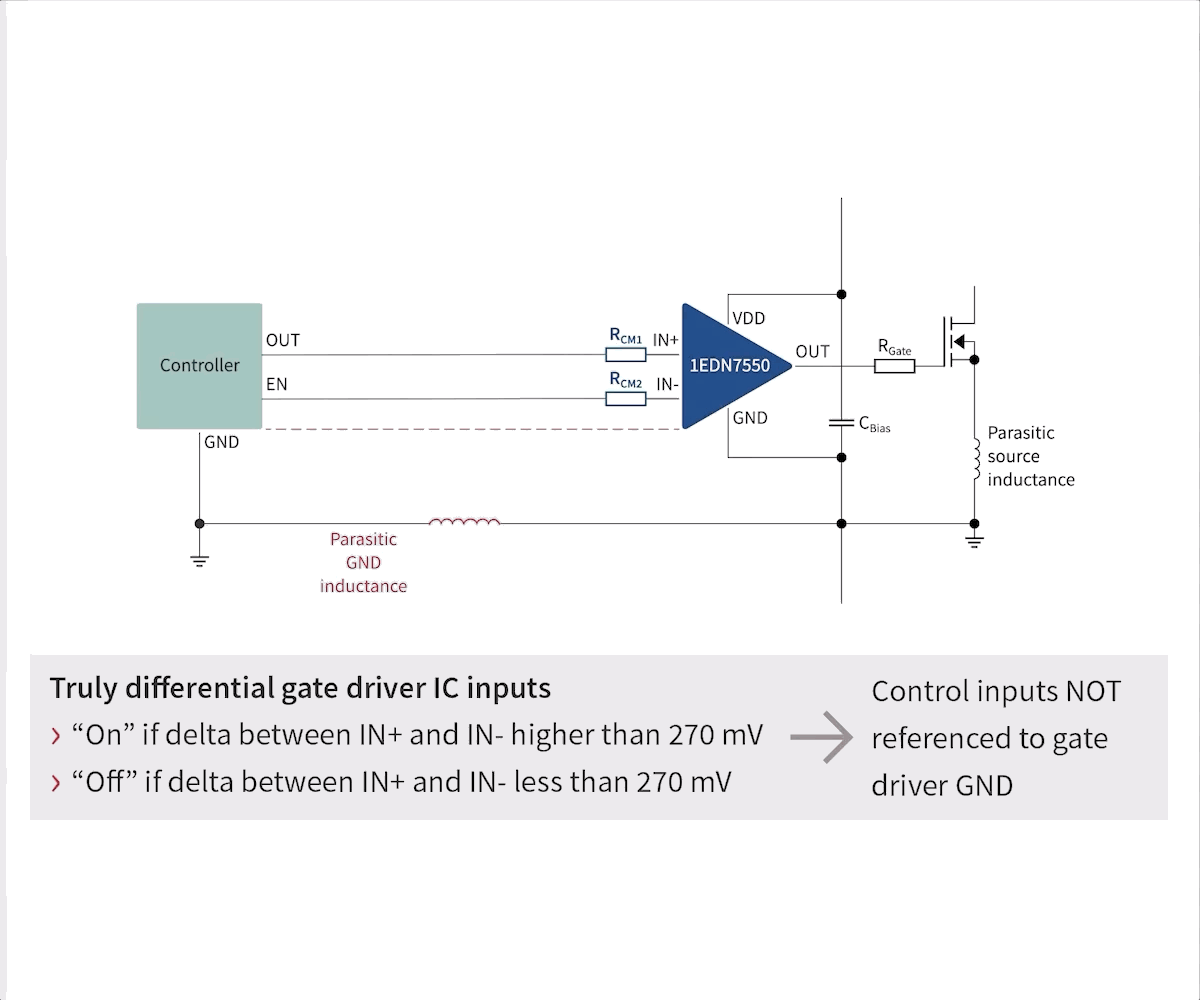Single-channel non-isolated gate driver│EiceDRIVER™ 1EDN TDI
Non-isolated gate drivers with Truly Differential Inputs: EiceDRIVER™ 1EDN TDI
The input signal levels of conventional low-side gate-driver ICs are referenced to the ground potential of the gate-driver IC. If in the application the ground potential of the gate-driver IC shifts excessively, false triggering of the gate-driver IC can occur. Overcome ground-shift challenges in your design with Infineon’s single-channel low-side EiceDRIVER™ gate-driver ICs, which have truly differential inputs
Gate-driver ground shifts can have two main causes:
- The parasitic ground inductance between where the gate-driver IC is placed and where the control-IC resides can be one reason. Applications where the distance between these two ICs is relatively long are prone to that. The need to use single- or dual-layer PCB material, as opposed to multi-layer PCBs, may be one root cause. Industrial design requirements or having the control IC on a daughter card can be another.
- A second reason for the gate-driver ground-shift can be parasitic source inductances between the gate-driver IC and the MOSFET driven by it. That’s particularly of relevance in hard-switching applications like PFCs and synchronous rectification stages.
The 1EDNx550x gate-driver ICs have truly differential inputs. Their control signal inputs are largely independent from the ground potential. Only the voltage difference between its two input contacts determines its output being “on” or being “off”. This prevents false triggering of power MOSFETs in a very elegant and robust way, and thus eliminates electrical overstress (EOS) of the power MOSFETs. The products are available in a small 6-pin SOT package as well as in an ultrasmall TSNP package.





Recommended documents
Watch latest video
To overcome ground-shift challenges in your design Infineon offers a single-channel non-isolated EiceDRIVER™ gate-driver ICs with truly differential inputs.
The 1EDN7550U is a non-isolated gate-driver IC and available in an ultrasmall TSNP package. It has truly differential control inputs, which enables cost-effective solutions with exceptional power density.
Benefit of non-isolated MOSFET gate driver with truly differential inputs in a PFC boost with 4 pin CoolMOS™ and the design as high-side and low-side driver in a half-bridge buck converter evaluation board.
Measurement of non-isolated MOSFET gate driver with truly differential inputs in a half-bridge buck converter evaluation board and ground shifting condition.
This evaluation kit provides a test platform for Infineon's 1-channel low-side 4/8A gate driver ICs. 1EDN - the new reference in ruggedness and low power dissipation.
The EiceDRIVER™ 1EDN TDI evaluation board demonstrator at PCIM 2019
Infineon's 1-channel low-side gate driver family with truly differential inputs prevents false triggering of power MOSFETs
Infineon offers a wide range of different EiceDRIVER™gate drivers for MOSFETs. 1EDN 1-channel MOSFET gate driver ICs serve as the essential link connecting control ICs, powerful MOSFETs and GaN switching devices. There is also a 2EDN 2-channel MOSFET driver ICs available. In addition, the 1-channel non-isolated gate drivers with Truly Differential Inputs called 1EDN TDI. Finally, the 2EDi, dual-channel isolated product family of gate driver ICs, designed for robust operation in high performance CoolMOS™, CoolSiC™ and OptiMOS™ MOSFET half-bridges.
Watch latest webinar
Learn more about Infineon's cutting-edge DC-DC conversion systems in the upcoming webinar.
Click here to learn more and here for the webinar QnA
Watch this video to learn about the world's smallest dual-channel low-side gate driver ICs and how to build high power density solutions for powering GPUs and CPUs in Artificial Intelligence, Computer Vision, and Machine Learning applications
In this webinar, we will visit a selected Gate Driver IC portfolio which shares a common set of strengths.

By taking this course you will learn more about…
- The gate driving limitation in SiC MOSFETs
- The reason for gate driving limitation parameters in datasheets
- The possible solution to overcome those issues and improve the reliability













